Best Ginger Teas Guide
This post may contain affiliate links. Simple Loose Leaf is a participant in the Amazon Associates Program, an affiliate advertising program designed to provide a means for sites to earn advertising fees by linking to Amazon.com.
Ginger, one of the most used spices in the word, is so versatile that you can use it with almost any other ingredient - fresh, sweet, spicy, sour and bitter. It tastes delicious in cakes, cookies, savory dishes and of course – in teas. Ginger tea is very easy to make, may provide countless health benefits, and it’s safe to use. What are the best ginger teas? Keep reading.
What is ginger tea
Ginger or Zingiber officinal is a plant originating from India. Today, ginger is growing in many countries around the world. Ginger is available in fresh, dried and powdered form and you can use all of them to make tea. Fresh and powdered ginger are most commonly used for cooking, while the dry ginger root pieces are often mixed into different tea blends. If you are making a homemade ginger tea, fresh ginger is a wonderful choice to make a very soothing and flavorful drink. Ginger flavor is often described as stimulating, pungent, piquant, aromatic, spicy, citrusy, zesty, earthy and warming. Flavor will depend on the type you are using too.What’s the best time to drink ginger tea?
Ginger contains no caffeine, so you can drink it at any time of the day or night. However, to maximise the benefits of ginger tea, you may want to consider the exact time you are drinking it. Some studies suggest that drinking ginger after meals may provide more benefits for digestion. If you want to avoid caffeine, a cup of ginger tea in the morning may help boost energy, mood and cognitive function[1]. Another study showed that taking ginger extract 30 minutes before a meal may help reduce hunger and appetite[2]. If you are using ginger powder, extract or tea to reduce the nausea in pregnancy, studies suggest taking it a few times a day[3]. Always consult your doctor before deciding to treat pregnancy nausea by yourself.Criteria for a “best” ginger tea
To find the best ginger tea, you will need to know what you are expecting from your cup of tea. Are you looking for a delicious flavor? Or do you want to a cup that may help you relieve nausea? Are you looking to boost your mood? Or do you need a little help in treating a common cold? Once you know what your expectations are, you can choose your tea better. In traditional Chinese medicine, fresh and dried ginger provides different benefits. Fresh ginger root is mostly used for common colds, coughing, morning sickness, vomiting and loss of appetite, while the dried ginger is used for shortness of breath, diarrhea, asthma, coughing, abdominal pain and vomiting[4]. If you are choosing fresh ginger, always follow the use-by date. Choose ginger with shiny, rather than wrinkled skin. They will be fresher and juicier. Organic ginger is usually available from specialised shops. When choosing tea blends containing ginger, pay attention to other ingredients as well. Some may contribute to the health benefits of ginger, some may add additional benefits. Some blends may contain a high ratio of dried ginger root, while others may only contain traces.Best tea for digestion
Ginger has been used for digestive problems for years. If you want to maximize the benefits and strengthen digestion, studies suggest mixing it with a bit of salt and fresh lemon and drinking after a meal[5]. Ginger may also help with weight loss goals. Studies suggest it may help enhance the thermic effect and reduce the feeling of hunger[6]. Try blending it with other ingredients that may promote digestion or weight loss. For example, one of the most popular teas in the world – chai – may bring wonderful benefits, especially when containing black pepper and fennel seeds. Fennel seeds are often used for digestive disorders[7] and piperine, a compound found in black pepper, may help with weight loss goals[8].Best tea for upset stomach
Ginger is very likely one of the best and safest herbal remedies for treating different types of stomach problems – from morning sickness in pregnancy, to motion sickness, and nausea and vomiting during chemotherapy. Drinking ginger is not only considered very likely safe but also recommended for treating nausea in pregnancy. Other commonly used herbs for treating nausea in pregnancy are peppermint, raspberry leaf and chamomile[9].Best ginger tea recipe
To make the best ginger tea at home, always use fresh ingredients. Fresh ingredients don’t only imply fresh raw ginger, but properly store dried ingredients and tea blends too. Both fresh and dried ginger will have an intense aromatic scent and flavor. To make the best ginger tea using fresh ginger, check out this recipe for a homemade ginger tea. If you want to spice up your regular cup of fresh ginger tea, try some of the following combinations:- Ginger and cinnamon
- Ginger and green tea
- Ginger and cardamom
Best ginger tea to drink (all-around favorite!)
Depending on which type of ginger you are using, the ultimate goal is to truly enjoy your cup of tea. Here are our favorite herbal teas blended with ginger:Coconut Spice
Coconut Spice is a tea to love, slowly enjoy, and savour to the last sip. Think of the scent of warm cinnamon rolls and strong chai spices, and you may get the idea. Sweet and subtle coconut and vanilla notes, deep and warming ginger, turmeric and fennel soul and a touch of cinnamon, all wrapped in turmeric powder, make this blend rich and spicy, but unusually light as well. Caffeine free. Perfect for afternoon and evening sipping.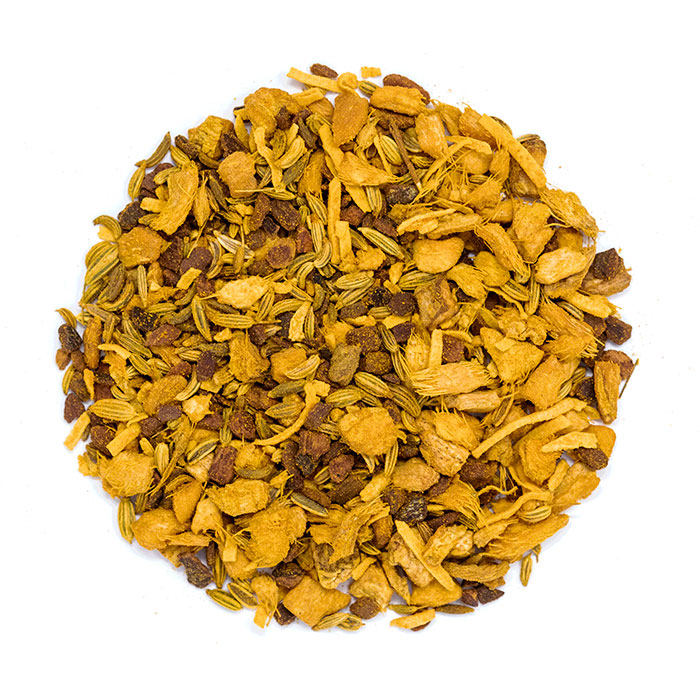
Coconut Spice
Bengal Chai Herbal
Bengal Chai Herbal is made with all traditional chai spices but blended with an earthy, smooth herbal rooibos tea. It’s perfect for evening teatimes, and strong enough to awaken all of your senses in the morning. It’s bold and deliciously spicy.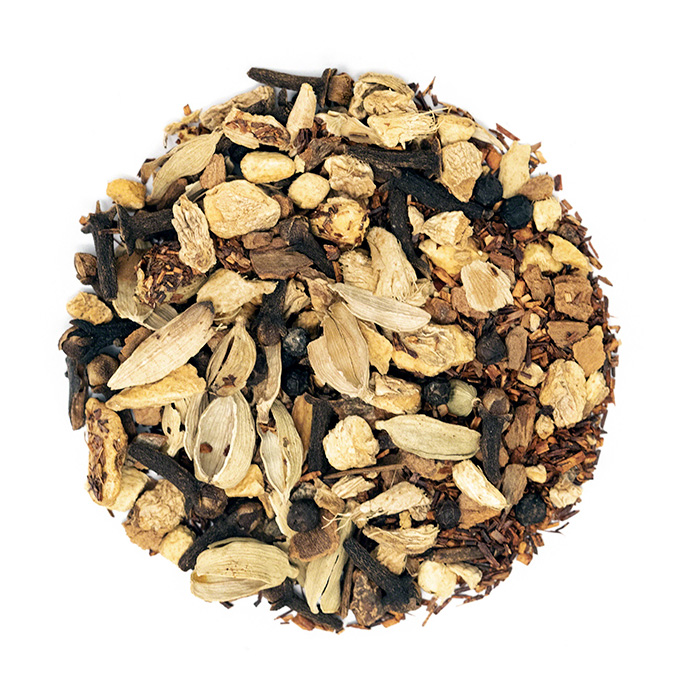
Bengal Chai herbal tea with rooibos
Vedic (Healer) Herbal
Vedic herbal tea is like a friendly hug in a cup, there for you whenever you need to feel warm, understood and help you to continue with your day. This tea is blended with spices and ashwagandha, adaptogenic root famous for its medicinal properties. What to expect? Spicy and inviting cinnamon scent, warming cloves, refreshing lemongrass, tingly red and black peppers, soothing ginger and sweet and woody cardamom that brew into a wonderful, light, yet spicy and well-balanced cup.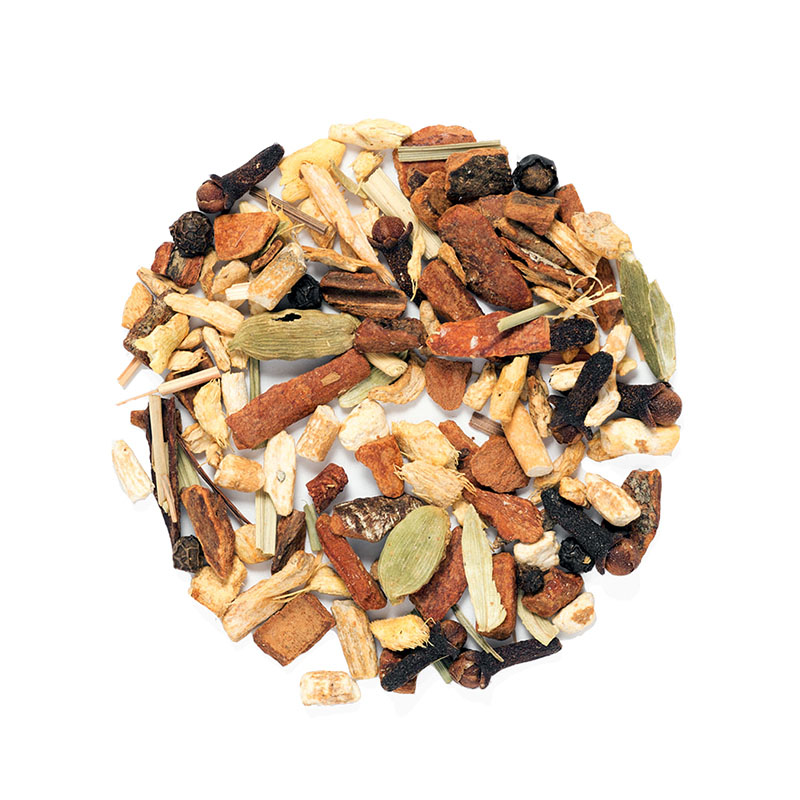
Vedic (healer) tea with ashwagandha
Honey Ginger Chamomile
Honey Ginger Chamomile is a blend of three simple ingredients in a blend that’s nothing less than awesome. Slightly sweet, slightly spicy, very soothing and calming, and great for any time of the day or night. Crafted with both tastiness and potential benefits in mind and great for making iced tea too.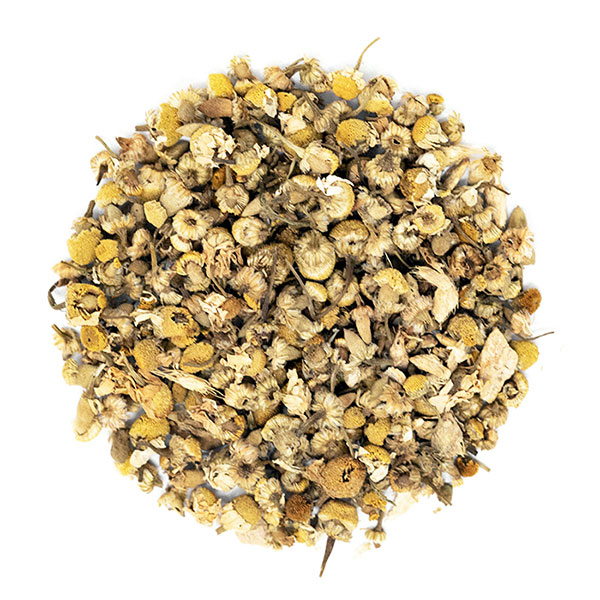
Honey Ginger Chamomile tea
Disclaimer: This article is for informational purposes only. It’s not intended to replace medical advice, diagnosis or treatment. Every person is different and may react to different herbs and teas differently. Never use teas or herbs to treat serious medical conditions on your own. Always seek professional medical advice before choosing home remedies.
References:
[1] https://www.ncbi.nlm.nih.gov/pmc/articles/PMC3253463/ [2] https://www.researchgate.net/publication/332796701_Evaluation_of_Ginger_Zingiber_Officinale_Roscoe_on_Energy_Metabolism_and_Obesity_Systematic_Review_and_Meta-Analysis [3] https://www.ncbi.nlm.nih.gov/pmc/articles/PMC4818021/ [4] https://www.meandqi.com/herb-database/dried-ginger [5] https://www.ncbi.nlm.nih.gov/pmc/articles/PMC4377061/ [6] https://www.ncbi.nlm.nih.gov/pmc/articles/PMC3408800/ [7] https://www.sciencedirect.com/topics/agricultural-and-biological-sciences/fennel [8] https://www.ncbi.nlm.nih.gov/pmc/articles/PMC3113382/ [9] https://pubmed.ncbi.nlm.nih.gov/10970756/
More from:
SLL


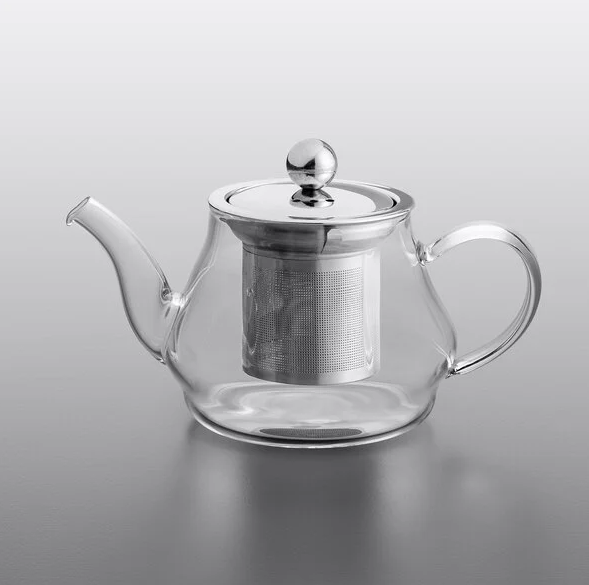
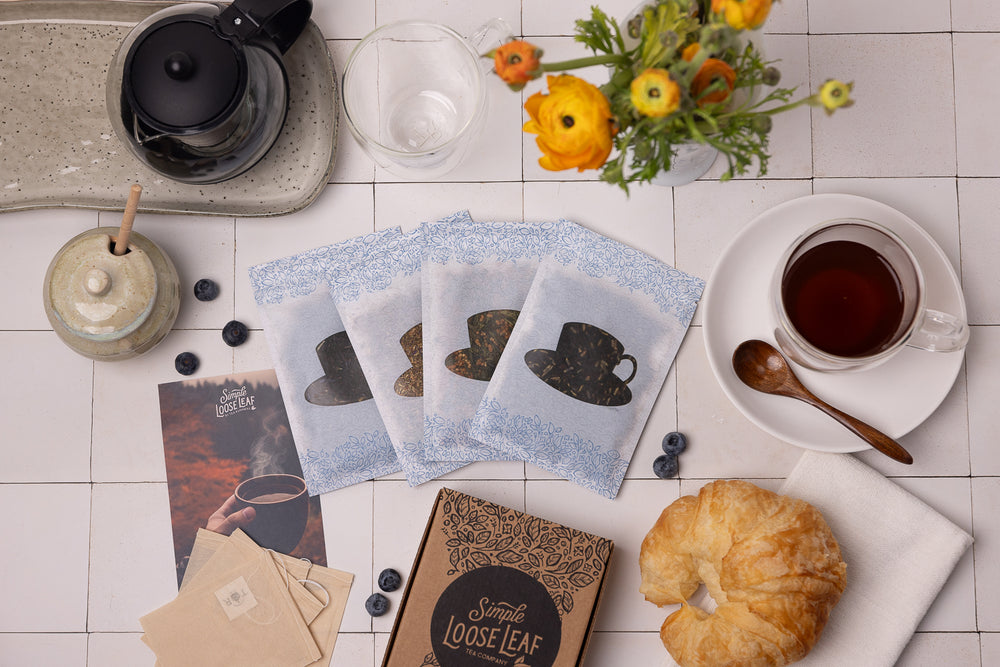

Leave a comment